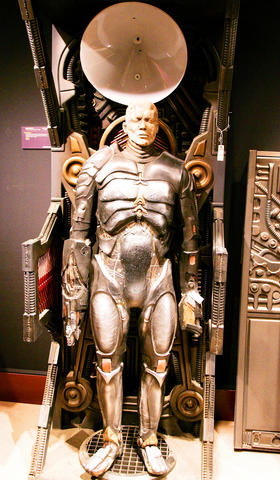Science fiction is dead. Long live science fiction.
For those of us who care (and no, we do not live in our parents' basements), the future of futurism is an urgent matter indeed. Is science fiction thriving amid the pyrotechnics, or is it dying a slow and hideous death, suffocated by publishing-industry group-think and unimaginative movie execs drunk on sequels?
I speak as a fan with opinions - as though there's any other kind - when I pronounce the sound health and shining future of 21st-century speculative fiction. I'm less concerned with the release this month of the megabudget Transformers movie, with its gargantuan alien robots and shiny cast, than a prevailing cultural shift that seems to embrace the expansive narrative frontiers of sci-fi. And I'm not even counting the genre's recent successes on television (Battlestar Galactica, Heroes, The 4400, Lost) or world-domination in games (take your pick).

PHOTOS: AFP
"It's everywhere now. Everybody has some exposure to it - it's much more respectable than it used to be," says David Wellington, a sci-fi/horror author (Monster Island, Thirteen Bullets) and aficionado who recalls the bad old days of fandom. "Back in the 80s, when I was a huge science-fiction fan, it was very marginalized. And we always complained about that: 'Why can't other people understand why we like this stuff so much?'"
Wellington is one of several devotees who, given the chance to vent, expresses enthusiasm as well as skepticism at the current state of the genre. Many view the landscape ahead with caution, fearing a post-apocalyptic vista mottled by computer-giddy graphics and the blunt force of mainstream taste. Some see it fragmenting. Others see it thrive.
But fans reach consensus - sort of - on a few key issues. One is that fantasy novels, once joined at the hip with science fiction, have enjoyed huge success since venturing into their own sizable niche. A second is that the film and publishing industries should take more artistic risks. A third: Blade Runner rocks. Fourth: so do Pan's Labryinth and Children of Men.

Exciting Times, Visually
A fifth point, expressed with varying degrees of disappointment and annoyance, is that advances in digital technology have made for gob-stopping eye candy that doesn't always satisfy the mind or the heart. From a visual standpoint, "there's no better time in the history of films for science fiction," says Dave Dorman, an in-demand sci-fi/fantasy painter based in Florida best known for his Star Wars renderings. "On the other hand, I think the writing of science-fiction films is not up to what it was back in, say, the 40s, 50s and 60s."

Craig Elliott, an animator for Disney (Treasure Planet) and DreamWorks (the upcoming The Princess and the Frog), puts it even more succinctly: "There's too much bling on the screen."
In publishing, contemporary science fiction has splintered into a zillion little sub-sets, running from alternate history and space opera to hardcore, urban fantasy, movie and TV tie-ins, cyberpunk and the boundary-stretching "New Weird."
Call it what you will, but great science fiction can be cosmic or minimalist, outward-looking or inward. It expands or contracts, pushing humanity into the farthest reaches of space or reducing it to cinders.
From the start, it's never been about the rubber-faced aliens, not really. Edwin A. Abbott's Flatland (written in 1884 and adapted repeatedly for film) is set in a two-dimensional world that skewers Victorian class distinctions. H.G. Wells and Jules Verne both injected the acid of satire into the pulp of sci-fi, and even the dated strangeness that is Karel Capek's R.U.R. (or Rossum's Universal Robots, the play that coined the word) was more concerned with sentience and civil rights than the construction of humanoid workers.
Do we watch Fritz Lang's Metropolis for the sexy android, or the Marxist parallels? Is The Day the Earth Stood Still about a guy in a soup can or a world poised on self-destruction? Sci-fi can offer visions of a humankind freed from poverty, racism and the horrors of war (see Star Trek's first two series) or ravaged by violence in a post-nuclear wasteland (Mad Maxes one through three). You can feel good or bum out, depending on your mood.
Lately, a lot of folks are bumming. During the past few years dystopian yarns have surged in popularity, prophesying tomorrows wracked by terrorism (V for Vendetta), zombie germs (28 Days Later, 28 Weeks Later) and infertility (Children of Men). All three of those films are set in London, the new vogue setting for ashen pessimism.
In literary fiction, Kazuo Ishiguro's Never Let Me Go moved dystopia to the English countryside. Margaret Atwood moved it stateside (The Handmaid's Tale, Oryx and Crake), while Cormac McCarthy pushed it even farther with The Road. Not everyone calls his Pulitzer Prize-winning novel science fiction, but that's what it is: Man and boy wade through the soot of an annihilated landscape.
Sci-fi/fantasy marketer and publicist Colleen Lindsay has high praise for McCarthy's book, but she's vexed by the perception that it's anything new. "It's post-apocalyptic fantasy for people who don't read fantasy." Look at David Brin's The Postman and S.M. Stirling's Dies the Fire, she says: similar books written by (gasp) genre authors and read by (gasp) geeks. Or consider Richard Matheson's classic 1954 I Am Legend, the original zombie-germ novel, adapted to film in 1964 (The Last Man on Earth), 1971 (The Omega Man) and now 2007 (I Am Legend, scheduled for the end of this year).
Kfir Luzzatto, a science-fiction author who lives in Israel, mentions John Christopher's The Death of Grass (1956) and Mary Shelley's The Last Man (1826), which foresees a late-21st century devastated by plague. "Post-apocalyptic culture has become to modern people what ghost stories were to our fathers," he says. "(It's) a way to air your fears of the unknown and to deal with them."
On the flip side, the more gung-ho element of sci-fi continues to pit good against evil, and good continues to win - after an extremely noisy fight. Consider those Transformers. "Do we believe that we're alone in this constant struggle, or do we believe that we can help each other?" asks Jamie Hari, who founded and runs the Marvel Database Project out of Toronto. Hari, who says "Marvel is my world" without embarrassment, sees the appeal of Transformers and robots in general "as another extension of the human desire for technology."
Pooping insects
A figure well familiar with this idea is Lawrence Krauss, a professor of physics at Case Western Reserve University in Cleveland, Ohio, and the author of The Physics of Star Trek. If you watch How William Shatner Changed the World, he's the one making pizza with the Shat.
"People like the idea of a hopeful future," Krauss says, later admitting that "the utopian view is harder for me to believe." Generally, the genre grabs his attention when it's smartly done but lost him at Starship Troopers: "The pooping insects, that sort of did it for me."
Otherwise, he says that science, like art, considers our place in the cosmic scheme. "The reason that we're scientists is not because we want to build a better toaster," he contends, "but because we're interested in what's possible in the universe."
Judging from anticipated movie releases, this is what's possible in the universe. Earth might be invaded by alien body snatchers (Invasion). It might face planetary death from a dying sun (Sunshine). It might be torn by global terrorism (Day Zero, upcoming). It might, in the field of engineering, produce super-powered exoskeletal armor (Iron Man, 2008), or it might form intergalactic relations with pointy-eared ET's (Star Trek, 2008). Alternately, a race of tiny aliens might tour the cosmos inside Eddie Murphy, who might then fall in love with an Earth babe (Starship Dave, 2008).
All of this looking forward strikes Houston's John Moore, an "unrepentant geek" and sci-fi/fantasy author (A Fate Worse than Dragons), as old news. "Science fiction is the present. We live in a science-fiction society, and I don't just mean the gadgetization of society." Instead, he means that "projecting into the future, once the province of the science-fiction writer, has become our dominant way of thought."

The primaries for this year’s nine-in-one local elections in November began early in this election cycle, starting last autumn. The local press has been full of tales of intrigue, betrayal, infighting and drama going back to the summer of 2024. This is not widely covered in the English-language press, and the nine-in-one elections are not well understood. The nine-in-one elections refer to the nine levels of local governments that go to the ballot, from the neighborhood and village borough chief level on up to the city mayor and county commissioner level. The main focus is on the 22 special municipality

The People’s Republic of China (PRC) invaded Vietnam in 1979, following a year of increasingly tense relations between the two states. Beijing viewed Vietnam’s close relations with Soviet Russia as a threat. One of the pretexts it used was the alleged mistreatment of the ethnic Chinese in Vietnam. Tension between the ethnic Chinese and governments in Vietnam had been ongoing for decades. The French used to play off the Vietnamese against the Chinese as a divide-and-rule strategy. The Saigon government in 1956 compelled all Vietnam-born Chinese to adopt Vietnamese citizenship. It also banned them from 11 trades they had previously

Jan. 12 to Jan. 18 At the start of an Indigenous heritage tour of Beitou District (北投) in Taipei, I was handed a sheet of paper titled Ritual Song for the Various Peoples of Tamsui (淡水各社祭祀歌). The lyrics were in Chinese with no literal meaning, accompanied by romanized pronunciation that sounded closer to Hoklo (commonly known as Taiwanese) than any Indigenous language. The translation explained that the song offered food and drink to one’s ancestors and wished for a bountiful harvest and deer hunting season. The program moved through sites related to the Ketagalan, a collective term for the

As devices from toys to cars get smarter, gadget makers are grappling with a shortage of memory needed for them to work. Dwindling supplies and soaring costs of Dynamic Random Access Memory (DRAM) that provides space for computers, smartphones and game consoles to run applications or multitask was a hot topic behind the scenes at the annual gadget extravaganza in Las Vegas. Once cheap and plentiful, DRAM — along with memory chips to simply store data — are in short supply because of the demand spikes from AI in everything from data centers to wearable devices. Samsung Electronics last week put out word